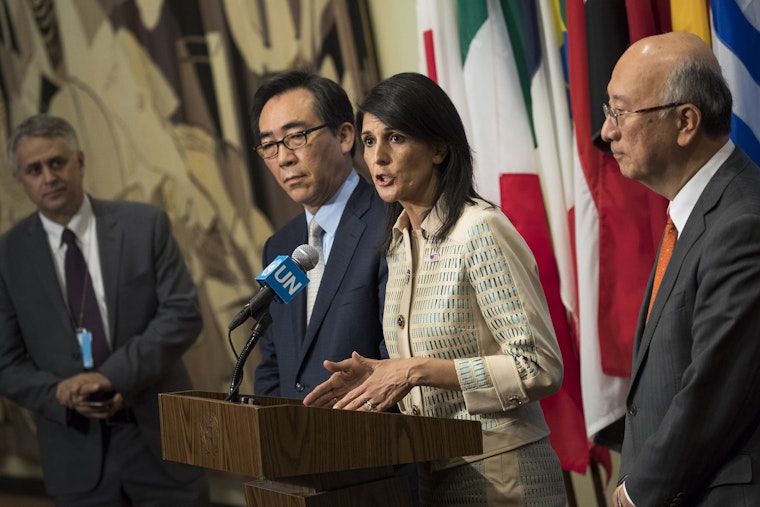The United States’ Vital Role in the UN Human Rights Council
By Jerry Fowler Jr.

On June 6, the U.S. Ambassador to the United Nations Nikki Haley addressed the United Nations Human Rights Council in Geneva. Although she said that the United States was “looking carefully at this council and our participation in it,” she also reaffirmed the United States’ commitment to human rights—and elaborated on the theme during a speech later the same day.
Despite its relative newness, the Human Rights Council has already become one of the UN’s most high-profile, and occasionally controversial, entities. The United States currently plays a vital role in its deliberations, and the council is one of the principal means through which it wields its influence within the global human rights movement.
What is the UN Human Rights Council?
The UN Human Rights Council is a body of the United Nations that was created in 2006. It has 47 members who are elected by the UN General Assembly, so its membership is drawn from the entire United Nations.
Why is the council influential?
The Human Rights Council is the international body where countries fight about what human rights mean. It’s often referred to as the premiere global forum for human rights. But it’s really an arena for fighting about human rights—and it’s very political.
Its importance comes from the fact that nearly all countries are involved with it, so when it reaches a conclusion about human rights, it represents the opinion of nearly all of the governments in the world.
What are some of the council’s most significant actions?
The Human Rights Council appointed a commission of inquiry on Syria in 2011. Since then, it has provided documentation about the atrocities that are being committed and who is committing them.
The Human Rights Council also appointed a commission of inquiry on North Korea in 2013, which produced a landmark report that really documented beyond doubt the human rights abuses of the North Korean government. As a consequence of that report, the UN Security Council, for the first time, addressed the issue of human rights abuses in North Korea.
Overall, the council has increased scrutiny on a number of country-specific situations in recent years. It also has played an important role in bringing issues of sexual orientation and gender identity into mainstream human rights discussions.
Why is the council controversial?
There are two main reasons why it’s controversial in some corners of the United States. First, because Item 7 of the council’s standing agenda is to investigate the “human rights situation in Palestine and other occupied Arab territories.” Singling out one specific situation like this is not fair—and the United States, in particular, has worked to get that item removed, and to have the council deal with the Israeli occupation under the generic agenda items, which are used for every other situation in the world.
Second, the council can be controversial because countries with poor human rights records do get elected to the council. Candidates are selected based on five geographic regions, and sometimes those regions put forward only as many candidates as there are seats. So if one of those candidates is an abuser, they still get a seat. More often than not, though, if a region puts forward more candidates than there are seats, then the abusive candidates don’t do so well.
Nevertheless, it’s important to note that the council is only controversial in certain circles in the United States (and among some human rights abusers). As a general matter, the council enjoys a lot of international legitimacy, principally because its membership is drawn from the universal membership of the United Nations.
What could happen if the United States withdrew from the council?
If the United States were to walk away, the fight over what human rights mean would still continue—but the United States would not have any influence over the outcome.
The United States was not a member of the council in its early years and did not engage with it significantly. The consequence was that a lot of the council’s work was basically being driven by countries, such as Pakistan and Egypt, that are hostile to human rights.
This is why it’s important that the United States is engaged: to swing the votes in favor of human rights. The United States is incredibly influential and it can be a leader in support of human rights. When it’s not there, that voice and leadership are missing.
What are some specific examples of the United States using its “voice and leadership” to influence council policy?
In general, the council is dealing with many more country-specific situations now than it was before the United States took its seat in 2009. The council was not dealing with Iran before the United States joined, for example, but now there is a special rapporteur on the human rights situation in Iran.
Another example is Sri Lanka, which had a very violent civil war that ended in 2009 and cost tens of thousands of civilian lives. In 2014, in part due to U.S. leadership, the Human Rights Council demanded accountability for abuses that were committed in connection to the war. The council has really pressed the Sri Lankan government to move forward on accountability and reconciliation. Since the United States joined, there has been a 180 degree change in approach.
Until January 2020, Jerry Fowler Jr. was the senior policy analyst for multilateral affairs at the Open Society Foundations.